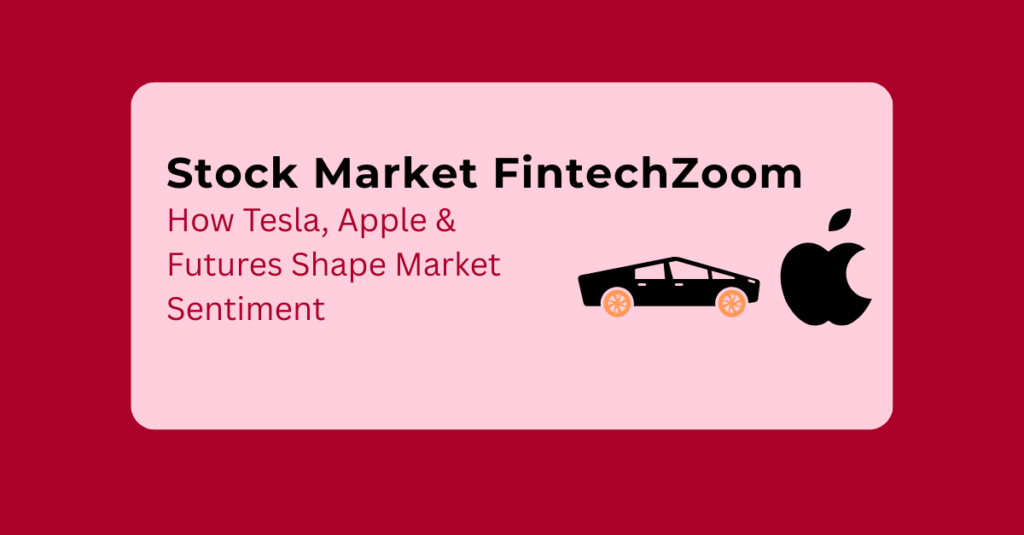In today’s dynamic market landscape, stock prices are influenced by far more than just earnings, valuations, and traditional financial indicators. A critical factor that drives short-term swings and long-term investor positioning is market sentiment—the collective mood, expectations, and reactions of investors.
- How Tesla Shapes Investor Mood and Market Trends
- Elon Musk’s Persona & Social Media Influence
- Sales, Deliveries & Market Reaction
- Valuation, Analyst Opinions & ESG Considerations
- Energy, Solar & AI Expansion
- Apple: The Steady Hand in the Market
- AI Strategy & Siri’s Struggles
- iPhone and Services: The Backbone
- Marketing, Ecosystem, and Supply Chain
- Design, Ecosystem, and Investor Confidence
- Valuation & Investor Patience
- Futures: The Market’s Sentiment Thermometer
- Pre-Market Futures as Early Indicators
- Global Events and Futures
- Protecting Investments vs. Short-Term Trading
- Price Discovery and Algorithmic Trading
- Sector Spillover
- Linking Futures with Tesla and Apple
- Comparison: Tesla, Apple & Futures in Market Sentiment
- Conclusion
- FAQs
For traders and readers who follow FintechZoom.com stocks, understanding market sentiment is crucial. It provides insight into why certain stocks rally on seemingly average earnings, or why markets tumble even in the face of strong fundamentals.
Among the many elements shaping sentiment, three stand out:
- Tesla, the innovation-driven yet volatile disruptor.
- Apple is a steady yet pressured technology giant.
- Futures are the market’s sentiment barometer that sets the tone even before trading begins.
This blog explores how each of these drivers—Tesla, Apple, and futures—affects investor psychology and broader stock market movements, helping traders and investors navigate opportunities and risks in 2025.
How Tesla Shapes Investor Mood and Market Trends

Tesla is not just an electric car company—it has become a symbol of growth, risk, and the future of technology. Its stock movements are often larger than those of other companies in the automotive or tech sectors, making it a powerful driver of market sentiment. For traders and readers following FintechZoom.com stocks, Tesla’s influence is hard to ignore.
Elon Musk’s Persona & Social Media Influence
Tesla’s story is closely tied to its CEO, Elon Musk. He is not only a leader but a public figure whose words and actions can move markets.
- Social media impact: Musk’s posts on X (formerly Twitter), from bold announcements to memes, can trigger large swings in Tesla stock.
- Positive example: Musk’s announcement of a Tesla stock split drove a sharp rally in shares within hours, showing how optimism around leadership and strategy can quickly boost sentiment.
- Negative example: Political controversies and confrontational remarks have triggered boycotts and falling sales in Europe and China, demonstrating how controversies can shift market sentiment almost immediately.
- Investor perception: His statements about AI, self-driving cars, and robotaxi services influence both short-term and long-term sentiment, keeping traders and analysts closely engaged.
- Pre-market effects: News related to Musk often causes Tesla futures to move before regular trading opens, shaping early market mood.
In essence, Tesla is unique: its stock is driven as much by personality as it is by products, making it one of the most sentiment-sensitive equities. Tesla is more than just a car company. Investors see it as a leader in energy, AI, and software, which keeps long-term optimism alive even when sales dip.
Here’s a closer look at Tesla’s innovation and challenges:
- History of innovation: Breakthroughs in electric vehicle design, battery technology, and autonomous driving made each product launch a market event. Tesla set the standard for the EV sector and generated huge enthusiasm among investors and tech communities.
- Signs of product fatigue (2025):
- The refreshed Model Y didn’t meet demand, with sales slipping in key markets.
- The Cybertruck, once highly anticipated, underdelivered. Critics called it one of the biggest flops in recent automotive history, citing insurance and resale issues that hurt consumer confidence.
- Rising competition: Rivals like BYD, Rivian, and Ford EVs are challenging Tesla’s market share, adding pressure to growth expectations.
This mix of high expectations and real-world pressure keeps Tesla’s stock volatile but keeps investors engaged. Even with sales slumps or product setbacks, the story of Tesla as a tech and energy innovator continues to influence market sentiment. It draws attention from analysts and traders following FintechZoom.com stocks.
Related: FintechZoom TSLA Stock Analysis: Tesla’s Market Performance & Future Outlook
Sales, Deliveries & Market Reaction
While Tesla thrives on big ideas and bold promises, actual sales numbers still matter—and they can quickly sway investor sentiment.
- Declining deliveries: When Tesla reports double-digit drops in key markets, traders and investors take notice. Even a single quarter of weaker-than-expected deliveries can spark nervousness across the EV sector.
- Short-term sentiment swings: Weak sales figures can turn excitement into caution, not just for Tesla, but for other electric vehicle makers and technology stocks. Market optimism can evaporate in hours if numbers fall short of expectations.
- Investor psychology: Each earnings report becomes a high-stakes moment. Analysts and retail investors alike scrutinize delivery numbers alongside Elon Musk’s commentary, fueling waves of market reaction that ripple through global stock indexes and discussions on FintechZoom.com.
Ultimately, sales performance keeps Tesla grounded in reality. Even with a compelling long-term vision, the stock is tethered to tangible results, reminding investors that innovation and hype must eventually meet execution.
Valuation, Analyst Opinions & ESG Considerations
Tesla’s stock price is closely watched because it can influence how investors feel about the market as a whole.
- High valuation: Tesla trades at around 70 times its expected earnings, which makes it very sensitive to news and rumors. Even small updates can cause big swings in the stock.
- Analyst debate: Experts are divided—some think the stock is too expensive, while others believe it has huge long-term potential. This constant debate keeps investors talking and adds to the stock’s ups and downs.
- ESG factor: Tesla’s work in clean energy and sustainability attracted socially responsible investors early on. However, Elon Musk’s controversies have sometimes cooled that enthusiasm.
Altogether, these factors make Tesla a key stock for understanding market sentiment. Every earnings report, delivery update, or major announcement often creates waves across the stock market.
Energy, Solar & AI Expansion
Beyond cars, Tesla’s influence extends to energy storage, solar power, and artificial intelligence:
- Growth in these areas could enhance Tesla’s long-term impact on investor sentiment.
- Currently, the company is seen primarily as an EV giant, but successful diversification could make it a broader market influencer.
- Investors track Tesla’s energy solutions and AI applications closely to gauge how the company may reshape sentiment across multiple sectors.
Apple: The Steady Hand in the Market

Apple is almost the opposite of Tesla. Instead of being driven by personality and hype, it is ecosystem-driven. As the world’s most valuable public company, Apple doesn’t just influence its own stock—it affects major market indexes like the S&P 500 and Nasdaq.
If Tesla is the rollercoaster of the stock market, Apple is the calm, steady ride. Investors may not get daily thrills from Apple headlines, but they know the company rarely surprises in a bad way. Its products, ecosystem, and financial discipline create a sense of reliability that helps stabilize overall market sentiment.
High expectations for constant innovation are always there, but Apple’s careful planning and strong foundation give investors confidence even when the company isn’t making headlines every day.
AI Strategy & Siri’s Struggles
Apple has faced criticism for being slower than rivals like Google, Microsoft, and Meta in AI. Key points from 2025:
- WWDC 2025 Reveal: Apple introduced “Apple Intelligence,” including call screening, live translation, and a polished “Liquid Glass” design. Analysts called the updates useful but not revolutionary.
- Market Reaction: Shares fell sharply after the event, wiping out nearly $75 billion in market value in one week.
- Siri Delays: Repeated setbacks in revamping Siri have frustrated investors and raised doubts about Apple’s competitiveness in AI.
- Measured Approach: On the positive side, Apple’s careful rollout reassures investors that the company prioritizes quality and long-term results over rushing features.
This shows how Apple’s innovation pace directly affects investor sentiment: underwhelming AI updates can reduce confidence quickly, while steady, thoughtful progress keeps trust intact.
iPhone and Services: The Backbone
Apple’s iPhone remains the bedrock of its business. Strong sales numbers give investors confidence that the company can weather bumps elsewhere.
- In Q3 2025, Apple reported $94 billion in revenue, with iPhone sales up 13% year-over-year, proving the device is still a major revenue driver.
- Services like iCloud, the App Store, and Apple Music bring in consistent income, helping keep investors confident even when new products don’t sell as expected, and can raise Apple’s share price by 2–3%.
This combination of hardware and services makes Apple a market anchor, keeping investors calm while tech peers experience more volatility.
Marketing, Ecosystem, and Supply Chain
Apple is a master at creating excitement without overselling. Leaks, rumors, and well-timed launches keep both consumers and investors engaged.
- Ecosystem loyalty: iPhones, Macs, Watches, and iPads all work seamlessly together, creating stickiness that builds trust.
- Supply chain sensitivity: Factory delays or geopolitical tensions can nudge sentiment, but these are usually temporary bumps.
Design, Ecosystem, and Investor Confidence
Apple doesn’t just rely on products to keep investors happy—it also invests in its ecosystem and shares profits to maintain confidence. Key points:
- Design & Interface: The new Liquid Glass interface modernized iOS and macOS. While visually appealing, some critics felt it didn’t add significant new functionality.
- Ecosystem Investments: Apple committed over $500 billion to U.S.-based AI research, development, and manufacturing, showing a long-term focus on strengthening its supply chain and ecosystem.
- Dividends & Buybacks: Regular dividends and stock buybacks reassure investors and show financial discipline. Even if product innovation slows, these moves help keep investor sentiment steady, especially for institutional shareholders.
Valuation & Investor Patience
Apple trades at a premium price, reflecting decades of strong performance, but high expectations come with challenges:
- Investors expect consistent, meaningful innovation to justify the premium.
- Sentiment platforms like Danelfin AI currently rate Apple as a cautious “Hold,” showing tempered optimism.
- If Apple delivers exciting AI products or breakthrough technologies in the coming years, sentiment could turn strongly bullish.
- On the other hand, delays or underwhelming launches may test investor patience and slow enthusiasm.
Futures: The Market’s Sentiment Thermometer
Futures don’t represent a single company—they reflect collective investor expectations. They often react before the stock market opens, giving traders an early look at how the day might unfold. Unlike Tesla or Apple, which influence sentiment through company-specific news, futures provide a broader gauge of market mood.
Pre-Market Futures as Early Indicators
Futures contracts for indexes like the S&P 500, Dow, and Nasdaq trade long before the market opens. They help investors understand how the market is likely to behave once trading starts.
- News reaction: Headlines like “Dow futures drop 300 points” can trigger fear or caution before the cash market even opens.
- Retail impact: Retail traders often adjust positions based on pre-market futures, so early moves can influence overall trading psychology.
Global Events and Futures
Futures are sensitive to global developments because they trade nearly 24/7. Some key factors include:
- Central bank decisions: Changes in interest rates or policy signals from the Federal Reserve.
- Economic data: CPI reports, jobs numbers, or GDP releases can move futures instantly.
- Geopolitical shocks: Wars, sanctions, or sudden commodity price spikes often affect sentiment immediately.
These characteristics make futures a real-time barometer for global market mood.
Protecting Investments vs. Short-Term Trading
Two types of players shape futures markets:
- Institutions protecting their investments: Portfolio managers use futures to protect against market swings.
- Traders seeking quick profits: These traders try to make money fast, which can make the market move up and down more sharply.
The interaction of these forces creates early signals of market sentiment that often spill over into the stock market.
Price Discovery and Algorithmic Trading
Futures play a key role in price discovery, helping markets determine stock and index values before the cash market opens.
- Trading systems react instantly: Computers and automated programs respond to futures moves right away.
- Impact on stocks: This can cause big stock orders, which follow the sentiment shown in futures.
- Futures influence: In other words, futures don’t just show market mood—they actually help shape how the market behaves.
Sector Spillover
Futures aren’t limited to indexes—they extend to commodities and cryptocurrencies, influencing market psychology across sectors:
- Oil futures: Rising oil prices can spark inflation fears, dragging equities down.
- Gold futures: Falling gold prices may signal a higher risk appetite among investors.
- Bitcoin and crypto futures: Movements in digital assets often impact tech and growth-oriented stocks.
This means futures connect different markets, helping investors anticipate sentiment shifts beyond equities.
Linking Futures with Tesla and Apple
While Tesla and Apple influence sentiment through their own stock moves, futures offer a broader early signal:
- Strong earnings from Apple can lift Nasdaq futures before the market opens.
- Weak Tesla delivery numbers may push futures lower, setting a cautious tone for the day.
- Because these two companies are so influential, their performance often tilts market expectations, which is why traders watch futures closely alongside Tesla and Apple.
Think of futures as a thermometer for market mood: they measure optimism or caution before trading actually begins, helping investors gauge overall sentiment in real time.
Comparison: Tesla, Apple & Futures in Market Sentiment
To see how these three drivers interact, consider their unique roles:
| Factor | How It Influences Sentiment | Typical Market Reaction | Key Notes |
| Tesla | Volatile, personality- and innovation-driven | Large swings in the EV sector and tech stocks | CEO actions, delivery numbers, and product launches drive short-term reactions |
| Apple | Steady, ecosystem- and product-driven | Stabilizes broader market sentiment | iPhone sales, services, and financial discipline maintain confidence; AI rollout affects mood |
| Futures | Early indicator of collective expectations | Sets tone before the market opens | React to global events, economic data, and major company earnings; influence multiple sectors |
- Tesla = Emotion-driven volatility.
- Apple = Stability with innovation pressure.
- Futures = Neutral but powerful sentiment thermometer.
Conclusion
Market sentiment is always shifting, influenced by news, innovations, earnings, and even social media updates. For readers following FintechZoom.com stock news, Tesla, Apple, and futures act as three key forces shaping how the market moves and how investors feel.
- Tesla highlights how leadership, innovation, and bold narratives can drive rapid swings in stock performance.
- Apple demonstrates the stabilizing power of strong fundamentals, a loyal ecosystem, and steady execution, even under pressure to deliver AI breakthroughs.
- Futures serve as a real-time gauge of collective market expectations, signaling sentiment before the market opens and responding instantly to global events and economic data.
By tracking these drivers, investors reading FintechZoom.com stock news can balance short-term signals with long-term fundamentals to make more informed decisions. In 2025, successful trading depends not just on numbers but on understanding the stories, trends, and sentiment behind them. Tesla, Apple, and futures together offer a clear view of the market’s heartbeat, helping investors stay ahead of daily market shifts.
FAQs
Q: Why does Tesla have such a big impact on market sentiment?
A: Tesla is seen as a symbol of innovation and risk. Its stock often moves sharply, and this volatility spreads to the wider market.
Q: How does Apple influence investor mood?
A: Apple acts as a bellwether for the tech sector. Strong iPhone sales and steady services growth boost confidence, while weakness creates fear.
Q: Why are futures important for tracking sentiment?
A: Futures show how traders expect indexes like the Nasdaq or S&P 500 to move. They give an early signal of market mood before trading begins.
Q: What makes FintechZoom useful for investors?
A: FintechZoom offers real-time prices, charts, analyst forecasts, and news updates, making it easier to track Tesla, Apple, and futures in one place.
Q: Which stock is seen as safer during volatility: Tesla or Apple?
A: Apple is usually seen as the safer choice because of its stable services revenue. Tesla carries more risk but offers higher growth potential.




